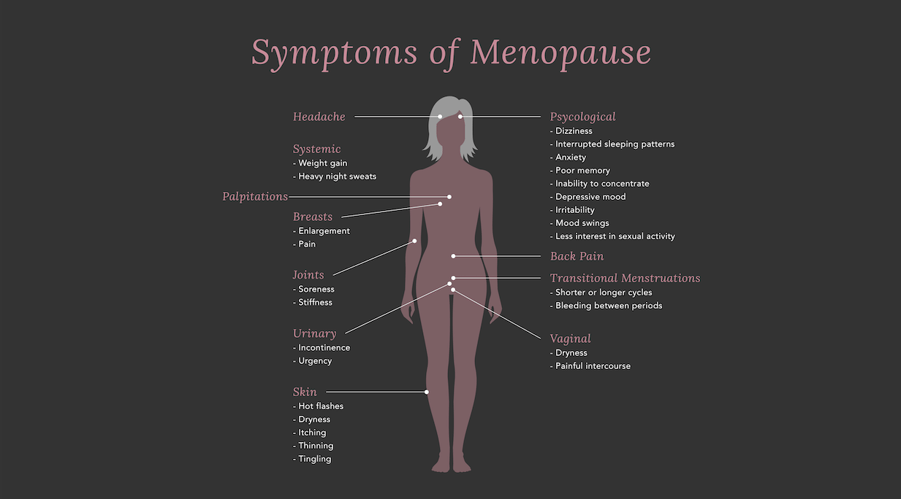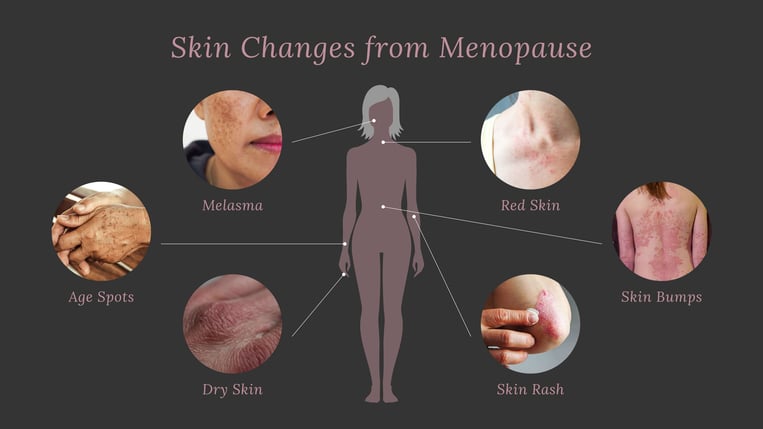To ease the process of menopause, where menstruation permanent stops and the body goes through a period of hormonal imbalance, here are some anti-aging tips to ease the negative or discomforting menopause symptoms:

Related: Skin in Different Life Stages: Understanding the Female Hormone Cycle
-
Hydration
Dry, thin and itchy skin are more sensitive and more prone to damage. Use perfume free skincare to avoid irritation. Avoid alcohol and nicotine intake as they dry up skin by taking up body water content to detox. Drink more than 8 glasses of water daily to stay hydrated and support skin cell turnover.
-
Sunscreen
As skin becomes thinner, it’ll be more prone to sun damage. Apply broad-spectrum, SPF 30 or above to face, necks, chest, arms, legs or any other area that are not covered by clothes. Apply sunscreen daily as part of your beauty regime regardless if you’re going out as sun rays can penetrate windows. When you are out and about, reapply sunscreen every 2 hours. Continue to apply sunscreen all year round including Winter days.
Related: Choosing the Best Sunscreen for Your Skin Type
-
Moisturize Skin
A proper re-look into your skincare products is necessary.
Avoid using hot baths/ showers or hot water when washing your face as hot water dries up skin. Pat skin dry instead of rubbing skin.
In addition, use aloe vera gel to increase moisture in your skin as well as coconut oil/ bio-oil to lock in the moisture of the outer skin daily. The best time to apply body lotion is immediately after a bath or shower. Other than applying skincare to your face and body, do not forget about the back of your hands and neck.
It is important to repair the epidermis of the skin. Look for moisturizers that contain ceramides and retinoids. Retinoids are derivatives of vitamin A which helps to slow down photo-aging and stimulate new collagen growth.
-
Cool Compress
Hot flashes are uncomfortable and may affect your sleep at night. To soothe itchy skin, skin rash and hot flashes, cool compress will help. Cover the itchy area with a damp towel overnight will help.
-
Healthy Diet And Calcium
At this stage, nutrients are particularly important in supporting the healthy development of bone, muscle, skin and liver. Bone structure will in ways affect the skin, reduction in bone mass, muscle mass and fat mass will make skin becomes excess in relative terms and cause skin sagging.
Avoid alcohol and caffeine as they negatively affect liver health which in turn affect the liver’s ability to keep hormonal balance.
Food with antioxidant properties such as green tea, blueberries will make your skin stronger. An easy way to ensure a proper healthy diet is one that is colorful. A diet rich in whole grains, fruits and vegetables are best. Vitamin B6, folic acids, Omega 3, collagen, calcium supplements may be considered if you find it difficult to intake sufficient amount from consumption of a healthy diet.
-
Treat Age Spots
When skin becomes thinner, pigmentation becomes more visible. Age spots are usually a sign of sun damage that has occurred earlier in life , leading up to menopause. Wear sunscreen daily at an early age is the best prevention of age spots.
Age spots are not dangerous and do not cause any health concerns. However, if you are concerned with their appearance, you can exfoliate gently to remove dead skin cells or apply skin-lightening products. Bleaching and tretinoin creams will help fade the age spots but it will take months to take effect. This cream will make your skin sensitive to UV damage hence extra sun care are necessary. Bring out your sunhat as well as reapplying sunscreen during the day.
LED light therapy is a treatment that will help to lessen age spots after a few sessions. It is a preferred method to laser pigmentation removal as it is less harsh on the skin but less effective as well. The nourishing LED lights, however, have skin healing benefits that promote cells regeneration.
Related: Fighting Dark Spots, Blemishes, and Splotchy Skin
-
Dermatologist Or Consult Doctor
If there are menopause symptoms that are troubling you, talk to your GP. It is also a good practice to have regular consultation with dermatologists and discuss any skin changes you observed especially if skin is visibly irritated. Bacterial or fungal infections will require medical treatments.
As skin age, there is a heightened risk of getting skin cancer. When skin cancer is detected early, it is highly treatable.

-
Facial Hair
In this time of hormone changes, you may observe more visible facial hair. To deal with unwanted facial hair, you may opt for non-permanent facial hair threading, which is to use a twisted string to snag and pluck unwanted facial hairs at beauty salon. If the unwanted facial hair is thick and dark instead of light then fine, you can then opt for a more convenient solution of IPL hair removal treatment. After using any of the aforementioned hair removal method, you may consider to use a prescription cream Vaniqua to slow hair regrowth.
-
Hair Loss Or Hair Thinning
Hormone changes may cause changes to your hair volume and texture. If you are concerned about hair loss and want to promote scalp and follicle health, you can look into anti-aging LED light treatment or Laser devices that stimulate hair regrowth.
Related: Getting to the Root Causes of Hair Thinning
-
Regular Exercise Or Outdoor Activities
Hormonal imbalances can affect your brain chemistry and cause mood swings, anxiety, and even depression. When you exercise, your body releases the happy hormone endorphins and gives you that positive feeling. Regular exercise helps reduce stress level, You will feel stronger, happier and sleep better.
Yoga and other breathing relaxation methods are especially effective in helping you to re-center. Choose something that works for you, even a slow walk in a park may do wonders.
-
Breast Examination
As women age, the milk system shrinks and a larger proportion of the breast is made up of fat. By menopause, most women's breasts are completely soft and may experience breast sagging. This can make lumps more noticeable. It is advisable to perform regular breast massages with breast firming cream or at the very least, regular breast checks in front of the mirror so that you are aware of your body change. Sometimes breasts change for no particular reason, but when in doubt, check with your doctor.
Related: More on Menopause and Itchy Skin
.png?width=180&height=80&name=imgpsh_fullsize_anim%20(1).png)

